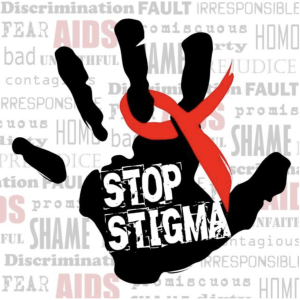
Despite major progress in treatment and prevention, being diagnosed with HIV can have a big emotional impact on individuals. People with HIV have higher rates of mental health problems than those seen in the general population. One reason for this may be HIV-related stigma, explains Professor Alan Winston from the Department of Infectious Disease.
Since the late 1990s, I have been treating people living with HIV and been involved in HIV clinical research. Many things we read about HIV are success stories, and quite rightly we should celebrate these tremendous scientific and medical advances. Life expectancy for someone with HIV is now similar to that of the general population. Antiretroviral therapy generally has manageable side effects and for most individuals, does not incur that many tablets per day. Indeed, many HIV treatments involve taking only one tablet per day. So, why then do so many people with HIV suffer from depression, other mental health conditions, and a poorer quality of life?
Experience in clinic
Most people living with HIV, once on a stable treatment, will attend their treatment centre twice per year. Often appointments rotate between a consultant or medical doctor once per year and a nurse specialist on the other occasion. As we can’t cure HIV, our patients attend for life, and we get to know them very well. At consultations, in addition to routine monitoring, we ask people how they are keeping. What stands out are the number of individuals who report symptoms of depression and other mental health conditions such as anxiety. Whilst many of us suffer from mental health complaints, the burden of these complaints in people living with HIV is very high. Thankfully, we do have help in clinic and have a specific clinic run by a psychiatry nurse specialist we can refer patients to.
Findings from research studies
The POPPY study was established in 2012 and is a UK and Ireland study assessing the effects of ageing and clinical outcomes in people living with HIV. Both people with and without HIV participate in the study. Symptoms of depression are present in 27 per cent of older and 21 per cent of younger people with HIV compared to only 8 per cent of people who don’t have HIV. Similar findings have been reported by the Positive Voices Study although no control population without HIV are included here.
Why are we seeing this?
It is not fully understood why we see such high rates of mental health conditions in people living with HIV, but there are many underlying theories. One theory is these mental health conditions are related to HIV itself, either the virus or the drugs that we use to treat the virus. Although we can treat HIV and suppress the virus in the body, we may not suppress all inflammation that HIV has caused in the past. Chronic inflammation can lead to neuroinflammation which has been associated with mental health conditions in other disease areas. Also, some of the antiretroviral drugs certainly do have neuropsychiatric side effects and can lead to depressive symptoms. However, although these factors may be of importance, they are unlikely to explain most of the mental health complaints we see.
Another factor is social isolation and loneliness leading to mental health conditions. Many people who have been living with HIV for several decades may have lost their friends and partners to AIDS back in the 1980s and early 1990s and don’t have the same support networks as individuals who did not go through such traumatic events in the past.
Stigma could also be a major contributing factor. Unlike many treatable medical conditions, many people with HIV would not freely talk about living with HIV and may only have disclosed their status to a few close friends or family. Many of us freely talk about our medical conditions and healthcare experiences with friends and family, sometimes even in the pub or at informal social gatherings. However, many people living with HIV would not freely talk about their medical care in this way in fear of discrimination and being stigmatised. This long-term stigma could be a major contributing factor to mental health conditions we see in people with HIV.
Still a long way to go
Last month, Imperial College celebrated Pride month but the education and celebrations still continue. Whilst progress has been made in celebrating and accepting diversity, we must question why people living with HIV still feel stigma around living with a treatable medical condition. We should not forget during Pride month celebrations that we still have a long way to go in accepting diversity in our workplace and society. Our recent podcast on stigma in HIV features experiences of from someone living with HIV in UK and puts many of the issues discussed in this blog into a real-life perspective.
Professor Alan Winston is a Professor of HIV and Genitourinary Medicine at Imperial’s Department of Infectious Disease Consultant Physician at St. Mary’s Hospital, London.
